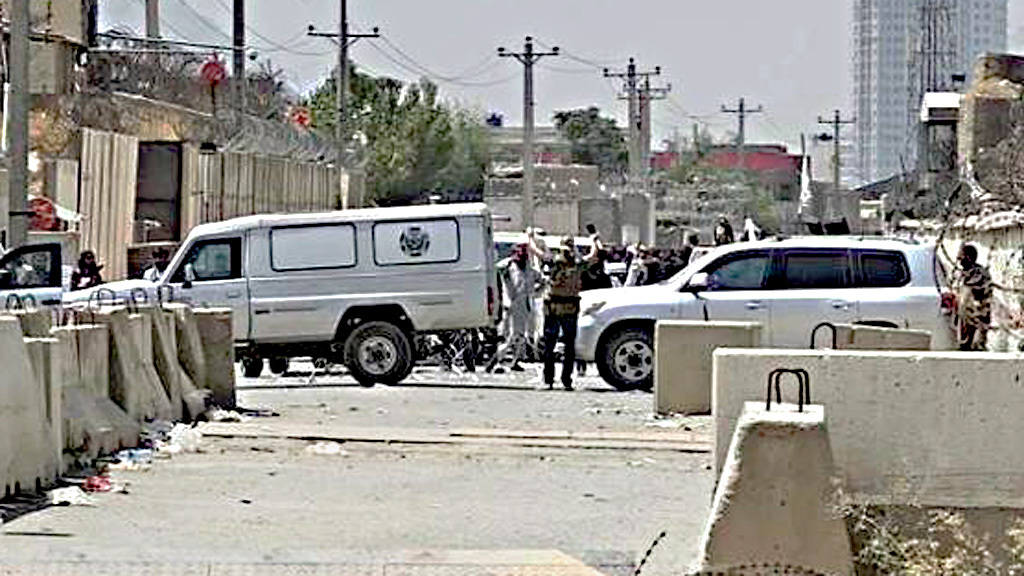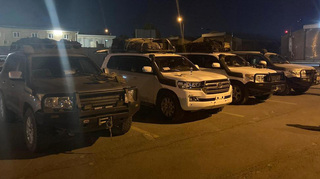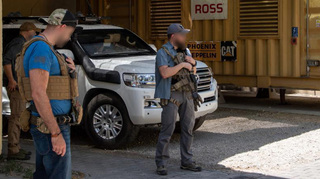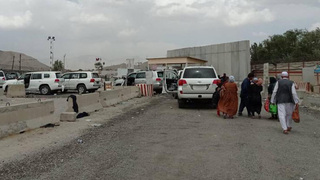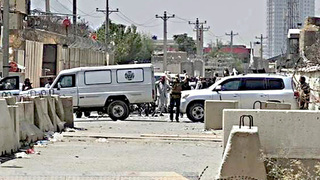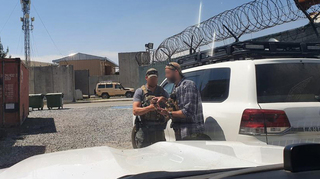ʻIt was pure improvisation. No training can prepare you for such a situation’, says the member of the Military Police and commander of the KAMBA unit, regarding the evacuation of the employees of the Czech Embassy in Kabul and all Afghan colleagues from the list authorised by the Ministry of Defence. He negotiated their evacuation with the Taliban militants for six hours. During the four days, he only slept for 4 hours, almost no food and water. He and his men contributed greatly to the speed and success of the Czech evacuation.
Recently, dramatic scenes at the Kabul airport took place. When the commander recalls the events of the four days, 14 – 17 August 2021, he appears calm and confident. He factually describes each and every detail of the rescue operation. He was not nearly as scared of the fire or for his life as he was for the destiny of the children, who were left at the airport. They were not family members of their colleagues and could therefore not be helped. ʻI was so very sorry. Mentally, this was the hardest thing to go through. I have a kid myself, who was waiting for me at home, and imagining that he is in such a situation and I cannot help him was the worst thing that can happen to you as a father.ʻ
The situation started to deteriorate rapidly in the last few weeks. When did you fully realize things were getting serious?
We had a list of a few milestone towns in the vicinity and we knew that if they fall, Taliban will have a way to get into Kabul. The nearest town was approximately 30 km away, so about two hours. Once we learned the town fell, we knew it was not going well for us. That’s why we started preparing for a faster evacuation of the embassy. All weapons we knew we weren’t going to use were packed right away, for example.
Did you know it was going to happen this fast?
Not at all. On Saturday 14 August, we had a regular meeting with the Ambassador, we discussed the hows of evacuating our local employees but there was no indication we would have to do it that very day. At two o’clock in the afternoon, I had a rendezvous with my U. S. counterpart and we agreed the situation in Kabul was reckoned to remain stable until the end of August. We said our goodbyes and he called me in half an hour to tell me that the U. S. Embassy launched a fast evacuation.
What did you do when the U. S. evacuation started?
The Czech Embassy was in the perimeter of the U. S. Embassy, so our entry gates were also guarded by the Americans. Our embassy also only had one emergency exit, via the U. S. Embassy. If they were to leave their positions, we would be locked inside and have no way to get out. That’s when I ordered the lads to start packing quickly and put on full gear. We also immediately called Prague, where the crisis management staff of the Ministry of Foreign Affairs was in session, to let them know.
What did the Czech evacuation look like?
I received a permission from the Operations Command (controls operations of the Czech Armed Forces on deployed operations) to immediately start the evacuation. The Ambassador and other members of the diplomatic mission, the Deputy Ambassador, embassy manager, everyone started packing as fast as possible. Personal items had to stay; we packed visa stickers, stamps, money. Before leaving, we revaluated the security situation in the city – Taliban was already on the peripheries, shots were fired. Another thing was that once evacuation started, communication stopped working among the international community, foreigners in Kabul. There was no one to call, no one to ask. Everyone was taking care of themselves.
I presume this was your first time leading an evacuation? Did you know how to proceed?
The most important thing was to make sure everybody stays out of harm’s way. If you know you have to pack up things and people, there isn’t much you can do wrong.
How was your way to the airport?
We got Czech diplomats onto three cars and verified with KAIA (Kabul International Airport) once more that they will let us in. I also called the U. S. Embassy to let them know we are evacuating to avoid surprising them with our armed vehicles.
The lads started out and we relied on Taliban’s statement that they would not attack the diplomatic community. On the other hand, everyone in Kabul uses the same vehicles, whether it is a local businessman or a diplomat, so mistakes can happen. Luckily, everything went well.
The bad news came right before reaching the airport, my deputy called to tell me the driveway to the airport was lined with white Taliban flags on poles.
Why was that important?
If someone hangs up Taliban flags along the main road, 200 metres from you, it means that the road is no longer guarded by local soldiers, but there are plenty of people sympathizing with the Taliban. We suspected that we would have to evacuate under adverse conditions. But we made it to the airport where we have left the Ambassador with two lads, the close protection officers, found him a shelter and our team withdrew to the embassy. We still needed to discard classified documents and secure some equipment.
We took all the laptops and electronic devices, we took out and recovered the hard drives and then we smashed the rest to pieces with a big mallet. My colleague who was in charge of documentation shredded anything classified and then burned the shredded pieces in a barrel. We managed to discard or recover everything, including expensive technology and equipment, state insignia, and embassy signs. The opponent could abuse all that. We were done at three in the morning (Sunday).
What was the journey to the airport like on Sunday morning a how did the situation look?
We heard shots being fired, but we recognized it was happy shooting. The Taliban was celebrating the capture of Kabul. We decided to risk it and go back to the airport before dawn. We locked down the embassy and boarded the cars. I still have the keys with me, by the way. It took us one hour and we had no connection to the outside world, except for our personal radios.
The airport was calm; we were one of the first embassies to evacuate. The worst was yet to come. At four AM, we parked our vehicles and lied down on their hoods to get a little rest.
How did the speed of the evacuation help you in the first few hours?
Other countries hadn’t even started yet and we already had a list prepared of local employees of the embassy. We just called them and told them to which gate they need to go, I picked them up and arranged their transfer. The situation was still very new, even the locals didn’t know, what was going to happen.
We checked some 50 persons – embassy employees and their families – including luggage, and we drove them to the terminal. We got them checked in, gathered them in the waiting room and watched over them. When we learned that our flight was redirected to Baku, we got them food and drinks – there were quite a few children in the group.
When did the situation start to deteriorate?
The very first day, militants penetrated the airport and the Turkish command responsible for KAIA security ordered to close down the area. The situation got much worse in front of the gates of the airport; there were crowds of hundreds of people. We had to find a way to get our people in. We borrowed a loudspeaker and started calling their names. We had to avoid other people getting through the pedestrian entrance – the main gate could not be opened – so we used a strobe light to briefly blind and paralyze the crowd. Then we just held a hand out and pulled our people out like a hat-trick. We spent the entire night going around the individual gates and pulling people out from the crowd. At the same time, we had to fulfil our other tasks, protect the Ambassador, assign a driver to drive people from the gates to the terminal, and another person to manage check-ins and boarding.
Tuesday was a lot more dramatic, right?
We kept getting new lists of people to save. But once we arrived to the gate, we saw there was no one waiting there and it was guarded by the UK military. The commanding officer told us the Taliban pushed the people back deep into the city. It is much harder to get someone to the airport when they are two kilometres away.
One of my lads and I asked the British to open the gate for us and we headed to the city on our own. After some 500 metres, we saw a check-point guarded by the Taliban. I left my colleague waiting further away, in a good firing position to cover me. I put down my weapons, held out my diplomatic passport, put my hands up and I walked towards them.
That must have been very hard. How does one negotiate with Taliban fighters?
They stared at me, astonished that anyone dares to approach them. I saw three older men sitting on the left and I figured out they must be the leaders. I pointed to them and showed them my passport. They came up to me, took the passport, looked through it, looked at the flag and then called one of the men, who spoke perfect English.
We talked for about two hours about the situation in the city and the people there. I tried to negotiate with them to let our colleagues go. I was careful to refer to them as employees of the Czech Embassy and not of the Czech Armed Forces. That would not have gone well.
I gave them their names and they started bringing me the persons from our list. I met one of their commanders who spoke great English – I think he might have studied in the UK. He brought me the last 30 people in one big group. The situation deteriorated afterwards, shots were fired in the air. Other people started to panic, they thought there was still hope and the Taliban had to intervene and beat them with special whips. We negotiated for six hours and I managed to get 81 persons out as well as two Polish females.
Did you see other countries’ military personnel negotiating evacuation of their people with the Taliban?
No and I don’t think anyone thought of doing that. The KAIA base was closed down and they assumed they would not be able to get out. We went in on our own.
Were you scared during the negotiations?
I had grim thoughts. If someone decided to “off” me, then they would. Shooting never ceased. I was more worried about someone blowing themselves up in the crowd.
Did your military and predeployment training help you?
It was pure improvisation. No training will prepare you for this. I never attended a negotiation course. In the Czech Republic, I work with the Security Service of the Military Police and the way I see it, even if I’m working in the Czech Republic, if I have to go somewhere and I don’t know anyone there, I need to find their boss and talk to them. I was imagining I am doing the same job as I would do at home. I just wasn’t negotiating with the good guys.
- The commander of KAMBA, his colleagues and the Ambassador of the Czech Republic left Afghanistan on the second military flight. A total of 195 persons were transported from Kabul to the Czech Republic in three days. The speed of the evacuation process, greatly facilitated by the commander of the KAMBA MP unit, was one of the reasons why the Czech Republic managed to dispatch evacuation flights so fast compared to others.
- The task of the KAMBA (Kabul Embassy) unit was to provide security to the Embassy of the Czech Republic in Kabul as well as close protection of members of the diplomatic missions during their trips outside of these premises.
